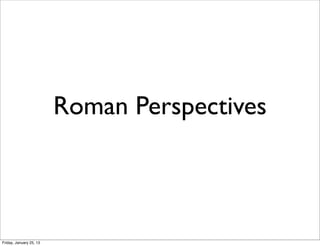
Roman authorship
- 1. Roman Perspectives Friday, January 25, 13
- 2. Codifying Invention and asking “how” rather than “why.” (Lauer 22-23) Friday, January 25, 13
- 3. first, a detour Friday, January 25, 13
- 4. St. Bonaventure Italian, 1224 - 1271 Friday, January 25, 13
- 5. A man might write the works of others, adding and changing nothing, in which case he is simply called a “scribe” (scriptor). Another writes the works of others with additions which are not his own; and he is called a “compiler” (compilator). Another writes both others’ works and his own, but with others’ work in the principal place, adding his own for purposes of explanation; and he is called a “commentator” (commentator). ... another writes both his own work and others’ but with his own work in principal place adding others’ for purposes of confirmation; and such a man should be called an “author” (auctor). (Eisenstein 122) Friday, January 25, 13
- 7. Tamara: What’s wrong with a compiler? And why can’t a compiler be an author? Why can’t a commentator be an author? Jess: Specifically thinking of my own work with community texts, I wonder: am I an author, if I write an introduction to a website of archived community publications? Am I merely a compiler and does this dismiss my own agency in the project, if I am relegated to a compiler rather than creator? I ask this because I still continue to go over this in my head about what my goals, my tasks, my roles are in this project. And I think it’s complicated because I’m not sure how to characterize myself. Friday, January 25, 13
- 8. Does unoriginality lack virtue? Friday, January 25, 13
- 9. Roman handbook tradition Friday, January 25, 13
- 10. Pliny: Naturalis Historia Friday, January 25, 13
- 11. Now, Rome Friday, January 25, 13
- 12. Friday, January 25, 13
- 13. “Invention is the discovery of valid or seemingly valid arguments to render one’s cause plausible.” (VII) Friday, January 25, 13
- 15. Can eloquence be an inventionary impetus for civic development? Friday, January 25, 13
- 16. Topical invention systems (Lauer 25) Friday, January 25, 13
- 17. Progression of thought across Cicero’s works Friday, January 25, 13
- 18. interpretation, dialectic Friday, January 25, 13
- 19. Friday, January 25, 13
- 20. Augustine & Davidson Friday, January 25, 13
- 21. the problems of interpretation Friday, January 25, 13
- 22. shared truth coherence of belief Friday, January 25, 13
- 23. love / desire Friday, January 25, 13
- 24. The chief purpose of all that we have been saying in our discussion of things is to make it understood that the fulfillment and end of the law and all the divine scripture is to love the thing which must be enjoyed and the thing which together with us can enjoy that thing. - De doctrina 1.84 Believing this enables one to know the truth - because it is the truth in its most general terms; or perhaps a better way to say it is that this double love of God and the neighbor who seeks God characterizes the truth. With this characterization in hand, the interpreter of scripture - which the interpreter believes to be revealing the truth - is able to tell when her initial (literal) reading must be wrong and so know to keep her mind open for another (transferred) meaning that will correspond with the truth as she already believes it to be characterized [38] Friday, January 25, 13
